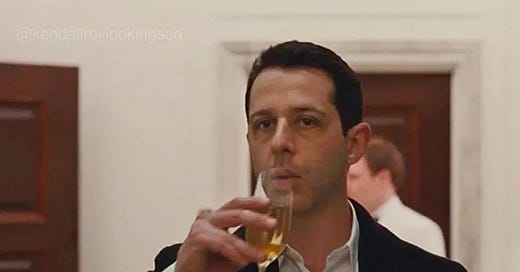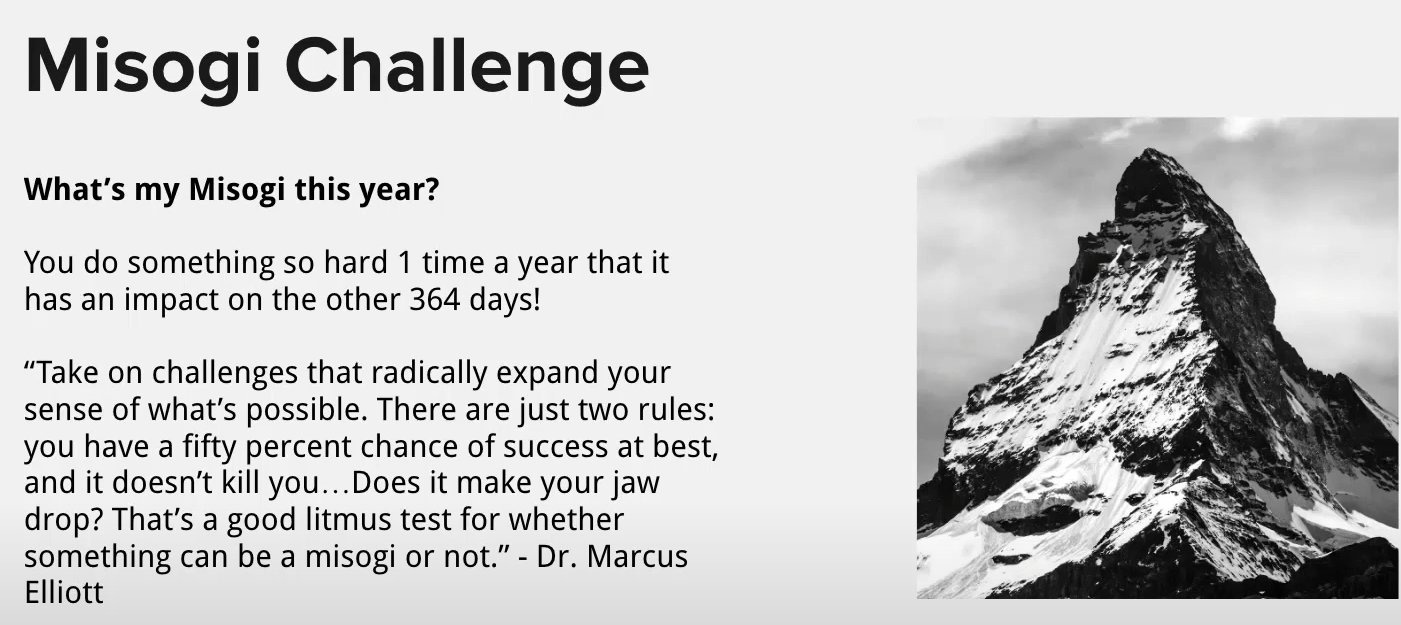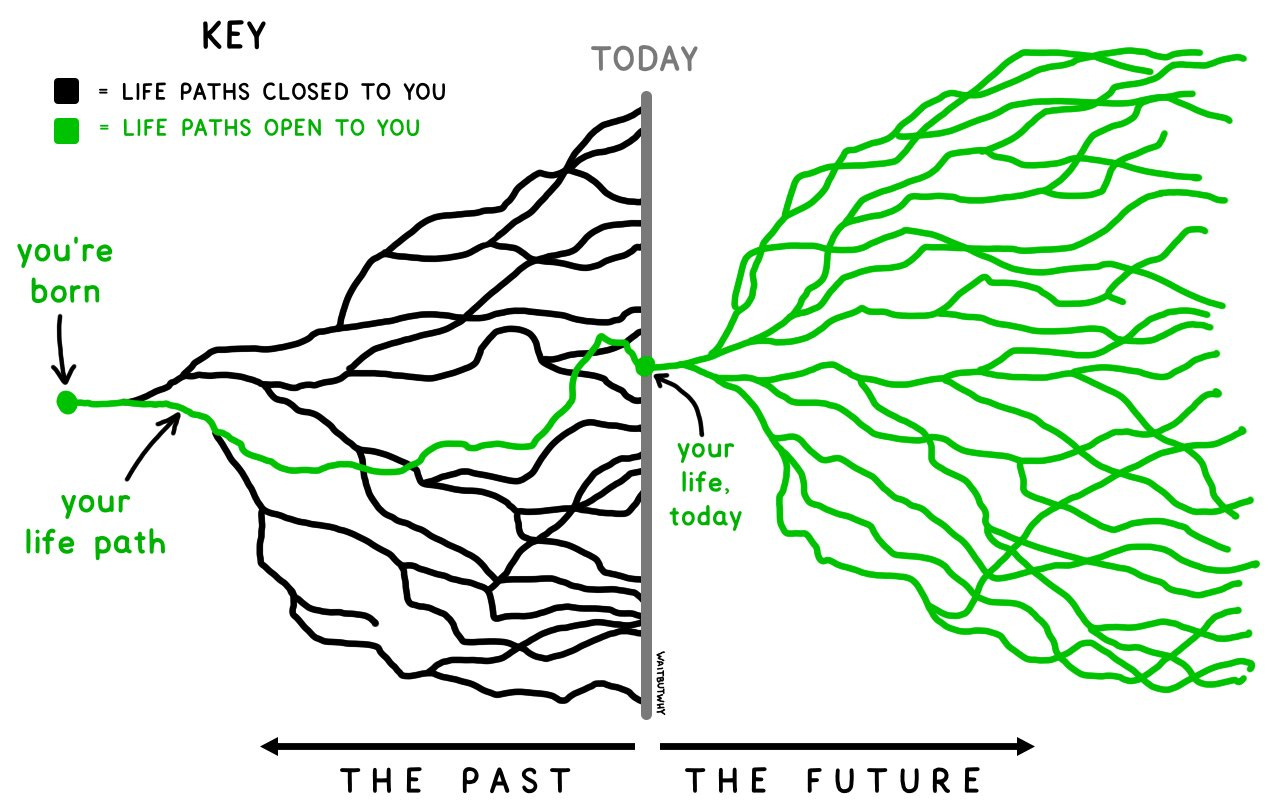Sitting With Uncomfortable Questions: A Different Kind of Year-End Review
"What you don’t do determines what you can do." Tim Ferriss
Hello everyone,
The year is coming to an end and it’s time for some of my favorite contemplative activities: long walks, extensive journaling, and deep conversations. I usually love December’s introspective mood. This time, I was brooding in the dark ambience of my hometown Tübingen. I ended up with more than the typical cheerful year-end review (last year I wrote about the New Year’s Conundrum).
It was uncomfortable, utterly necessary, and I’d highly recommend it.
Let me explain.
There are two ways to recap a year.
There’s a fun way. The way of motivational quotes, Twitter threads, and LinkedIn posts. Charts that go up and to the right, endless prompts and exercises, and tons of ✨frameworks✨. It’s a process that’s supposed to energize and inspire.
This year, I enjoyed three pieces with a variety of questions and ideas by Sean Delaney, Dickie Bush, and Sahil Bloom. For example:
What were the big moments, memories, and milestones from this year?
What were my greatest hits and worst misses this year? Your natural bias skews how you see your year—the optimist sees all hits and the pessimist sees all misses. The objective here is a balanced view.
What did I change my mind on this year?
What created energy this year?
What drained energy this year?
What did I not do because of fear?
And so on, you get the point.
Sean’s a terrific coach and podcaster and his presentation reflects his structured way of thinking, balancing reflection and goals in different areas of life (work, family, health, etc.). If you’re looking to comprehensively review your life and make changes next year, check out his presentation.
I especially like his idea of the Misogi Challenge, an action whose momentum could positively affect everything else.
I have no issue with the inspirational and energizing approach to the year-end. But it can become the kind of fantasy Phil Stutz warns us of. An escape into frameworks, long lists of lofty aspirations, motivational quotes. Shoot for Mars, and next year will be your moon landing. It can turn into a distraction from what truly demands our attention.
There is a second way. The way of sitting with the uncomfortable truths of our lives. Like a cold shower, this approach requires overcoming some resistance.
Some questions allow you to go deeper the longer you sit with them. The answers get bigger and bigger every time you dig. For example:
What did I not do because of fear?
It’s easy for me to find first-level answers. Like not experimenting more with video. Or hiding in history because the present is so messy. Avoiding topics where it’s easy to be wrong. But really there are a lot more things I haven’t done because fear held me back.
These are the ideas we discarded because they seemed too challenging, too risky. The moments we didn’t lean in for a kiss or avoided a conversation. The moments when we got into our own way and let resistance keep us from being fully present.
Only the ones most deeply connected to our hearts remain in our memories. All other possible paths quickly fade.
But that’s the past. What about the conditions that persist?
What drained energy this year?
What a question. What, or who, drained energy?
What causes misery, what distracts you, what leaves you weak in your body? What causes sleepless nights and distraught phone calls? Identify what you hide from others or what you share because it overwhelms you.
The longer you sit with this question, the bigger the answers can get. They move from busywork and errands to major projects, perhaps even to the foundations of your career. They may start with acquaintances and make their way to your most important relationships. This is where sunk cost, commitment bias, and identity are at home.
This is where Part X will resist seeing reality clearly. This is where any attempt at change will be met with a bloody street fight. You might need data or practical evidence to tackle this.
I keep a daily spreadsheet with information like sleep, mood, and routines. I used to track meals and whether I had coffee — talk about overkill. But it’s helpful to spot outlier days and recurring patterns. What activities, thoughts, and people show up during our best and worst times?
For example, over the past year I tried unsuccessfully to mend an old relationship (some long-time readers may remember the drama). I wanted it to work so badly that I had to see the data to realize that every attempt turned into a moment when energy drained out of my life.
You can do a similar exercise in your work or portfolio. What position, or type of position, wrecks your sleep? What client’s call makes you break out in sweat? What project causes you to buy extra bottles of painkillers?
A related and important question is:
How am I complicit in the situation I find myself in?
Of course, some situations and relationships are handed to us. But even if we can’t directly change or remove them, it’s worth reflecting on why our reactions are so negative — and why they persist.
In other words: why? Why is this part of my life? What am I getting out of it? Why am I holding on?
If we don’t find answers to this question, we risk treating merely the symptoms. We plug one hole but open the next one because we don’t understand our own role in the situation.
Paradoxically, what drains us may also serve a purpose. We can find clues in the stories we tell others about your life. What is your answer when asked how things are going? How do you frame your life? Whatever you identified as a drain, how does it show up in the narrative you tell others?
For example, on the one hand I am looking for a happy and fulfilling relationship. But I am still getting something out of the misery of an unsuccessful pursuit. It gives me something to write and talk about. It gives me a role to play: the long-suffering and heartbroken writer (a character that can start draining the energy of others over time). It offers an excuse to withdraw and not put in the effort to go on other dates. It’s an excuse not to try.
In other words, it offers the sad comfort of certainty. It’s insidious and leads to stagnation. It’s important to see that clearly.
This line of questioning is related to a theme in The Money Game: it is imperative that any active investor clearly understand their own emotions and motivations.
“Win or lose, everybody gets what they want out of the market,” legendary trader Ed Seykota once said. He was hinting at traders’ unconscious motivations, noting that “some seem to like to lose, so they win by losing money.”
If certain mistakes and patterns persist, it’s not enough to audit the investment process. It’s important to follow the line of questioning deeper, all the way to your secret motivations and beliefs about yourself. The kind of stuff you’d rather not look at.
When you hear the alarm bells ringing, keep going. Get to the bottom of why some things you think you want to get rid off remain part of your life. Why and how they’ve become part of your story. What hole would they leave if you removed them?
If you aim to make big changes, look past the symptoms. Go further than the feel-good list of goals and affirmations.
Sit with the uncomfortable questions and don’t let yourself get distracted by first-level answers. Look at the data. Dissect the story. Ask someone who knows you well for honest feedback. Consider the why.
I wish you all a happy and prosperous new year!
Thank you for reading,
Frederik








Hi Fred, I absolutely love your post. I’ve been thinking about this lately. Especially the fear part. But I’m thinking what fear is the real fear instead of things making up in my mind. Like at what point you can say ok I need to avoid confronting the thing I fear because the fear is for real and at what point I need to do the hard work and overcome the fear
Really wonderful post, Frederik.